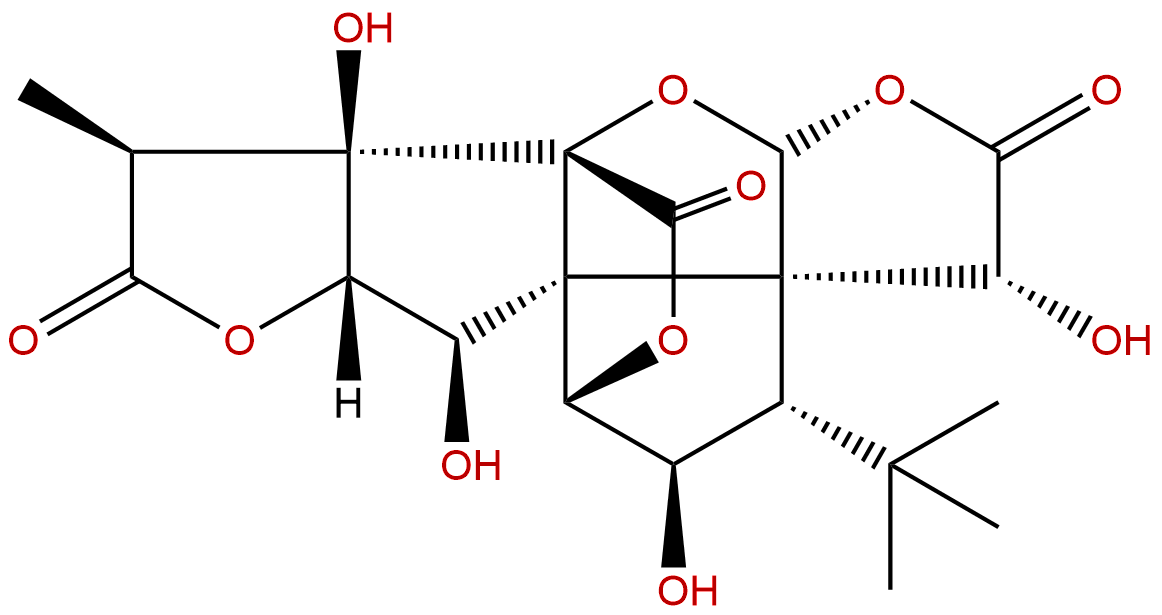
Ginkgolide CCAS No.:15291-76-6
|
||||||||||
 |
|
|
||||||||

| Catalogue No.: | BP0648 |
| Formula: | C20H24O11 |
| Mol Weight: | 440.401 |
Product name: Ginkgolide C
Synonym name:
Catalogue No.: BP0648
Cas No.: 15291-76-6
Formula: C20H24O11
Mol Weight: 440.401
Botanical Source: Ginkgo biloba L.
Physical Description:
Type of Compound: Diterpenoids
Purity: 95%~99%
Analysis Method: HPLC-DAD or/and HPLC-ELSD
Identification Method: Mass, NMR
Packing: Brown vial or HDPE plastic bottle
Storage: Store in a well closed container, protected from air and light. Put into refrigerate or freeze for long term storage.
Whenever possible, you should prepare and use solutions on the same day. However, if you need to make up stock solutions in advance, we recommend that you store the solution as aliquots in tightly sealed vials at -20℃. Generally, these will be useable for up to two weeks.
The product could be supplied from milligrams to grams
Inquire for bulk scale.
Description:
Ginkgolide C is a potent inhibitor of collagen-stimulated platelet aggregation, it may increase intracellular cAMP and cGMP production and MMP-9 activity, inhibit intracellular Ca(2+) mobilization and TXA(2) production. Ginkgolide C has anti-adipogenic and ameliorating Alzheimer disease effects; it also can increase△LVP significantly,enhances the myocardial systolic and diastolic function of rats,but has no significant effect on HR while it shows inotropic activity.
References:
Evid Based Complement Alternat Med. 2015; 2015: 298635.
Ginkgolide C Suppresses Adipogenesis in 3T3-L1 Adipocytes via the AMPK Signaling Pathway
Ginkgolide C, isolated from Ginkgo biloba leaves, is a flavone reported to have multiple biological functions, from decreased platelet aggregation to ameliorating Alzheimer disease. The study aim was to evaluate the antiadipogenic effect of Ginkgolide C in 3T3-L1 adipocytes.
METHODS AND RESULTS:
Ginkgolide C was used to treat differentiated 3T3-L1 cells. Cell supernatant was collected to assay glycerol release, and cells were lysed to measure protein and gene expression related to adipogenesis and lipolysis by western blot and real-time PCR, respectively. Ginkgolide C significantly suppressed lipid accumulation in differentiated adipocytes. It also decreased adipogenesis-related transcription factor expression, including peroxisome proliferator-activated receptor and CCAAT/enhancer-binding protein. Furthermore, Ginkgolide C enhanced adipose triglyceride lipase and hormone-sensitive lipase production for lipolysis and increased phosphorylation of AMP-activated protein kinase (AMPK), resulting in decreased activity of acetyl-CoA carboxylase for fatty acid synthesis. In coculture with an AMPK inhibitor (compound C), Ginkgolide C also improved activation of sirtuin 1 and phosphorylation of AMPK in differentiated 3T3-L1 cells.
CONCLUSIONS:
The results suggest that Ginkgolide C is an effective flavone for increasing lipolysis and inhibiting adipogenesis in adipocytes through the activated AMPK pathway.
Proceeding of Clinical Medicine, 2013, 22(7):524-6.
Effect of Ginkgolide C in cardiac function of rats in the body.
To study the effect of Ginkgolide C(GC) in cardiac function of rats in the body.
METHODS AND RESULTS:
: Normal rats after anesthetized,inserted the intubate which connecting the pressure transducer into left ventricular from the right common carotid artery,then detected the cardiac function by the PowerLab biological signal acquisition system.Gave each of saline,1‰dimethyl sulfoxide(DMSO),100 μ mol / L GC,1 000 μ mol / L GC 1ml from the jugular vein,detected the cardiac function before and after administration by continuous recording the left ventricular systolic pressure(LVSP),left ventricular end diastolic pressure(LVEDP),the maximal rate of pressure increase in systole phase(+dp / dtmax),maximal rate of pressure decrease in diastole phase(-dp / dtmax) and heart rate(HR).Compared with normal conditions,when given 100 μ mol / L GC,there are no significant effect on cardiac function;when given 1 000 μ mol / L GC,it showed inotropic activity by increasing △LVP,+dp / dtmax,-dp / dtmax significantly,but had no significant effect on HR.
CONCLUSIONS:
Ginkgolide C can increase△LVP significantly,enhances the myocardial systolic and diastolic function of rats,but has no significant effect on HR while it shows inotropic activity.
HPLC of Ginkgolide C
